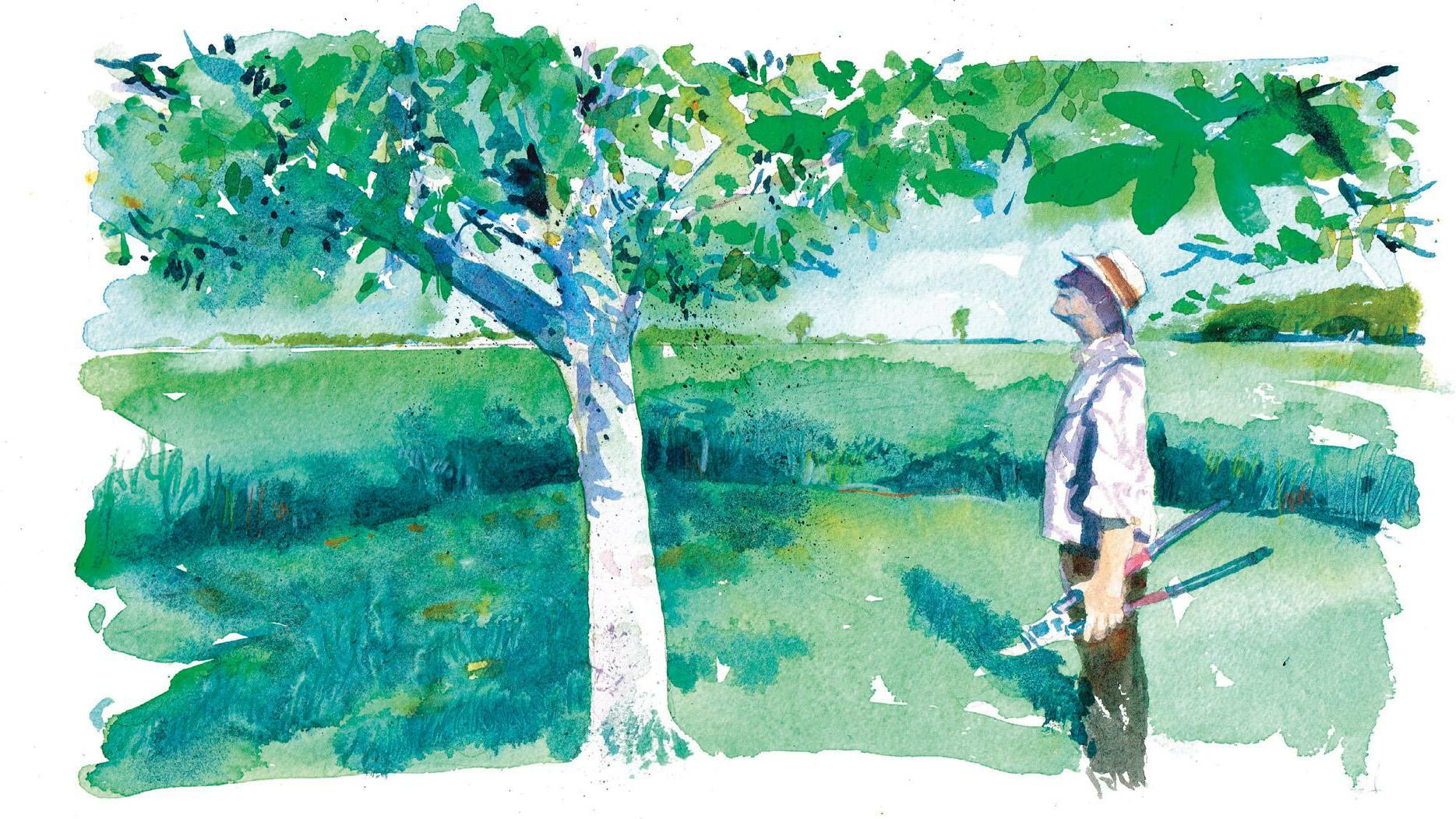
S TANDING under the beech tree, looking up into the cave roof of blue shade, the density of the tree’s canopy blocking out the day’s sunshine. In late spring and summer, the beech is the parasol tree, casting glad, cooling shade for the weary walker, the picnicker and, doubtless, once upon a time, for persecuted outlaws, the Robin Hoods.
No British tree, not even oak, has such presence as beech. A single beech tree, such as this one in the copse, is sufficient in itself to create the quintessence of beechwood: the sense of entering a churchy, sacred space: the immense grey pillars, that vaulted ceiling, the mystried gloom.
Oak is the hail-fellow King of the Wood, beech the Ice Queen. Oak is one trope for Britain, hearty, rustic and guileless; the smooth- boled beech is the alternative Britain, the shadow self, secret, minimalist, spiritual.
Oh, yes, and standing under a beech causes me to philosophise even when working, as I am this morning, lopping select lower branches with long-handled pruners to make ‘tree hay’. Collecting tree leaves for feeding livestock, usually from pollards, is a vanishingly small component of farming, although once it was widespread across Europe and likely predates the scything of grass to make ‘proper’ hay.
I only have a handful of pollards, so I prune lower limbs of hazel, beech, sallow, hawthorn, blackthorn, elm, ash, lime and field maple in copse, hedge, orchard and garden. However, only those trees brazenly daubed by a dob of white paint are pruned, the trees/bushes I know categorically do not have birds nesting below 20ft and so remarked.
Denne historien er fra May 29, 2024-utgaven av Country Life UK.
Start din 7-dagers gratis prøveperiode på Magzter GOLD for å få tilgang til tusenvis av utvalgte premiumhistorier og 9000+ magasiner og aviser.
Allerede abonnent ? Logg på
Denne historien er fra May 29, 2024-utgaven av Country Life UK.
Start din 7-dagers gratis prøveperiode på Magzter GOLD for å få tilgang til tusenvis av utvalgte premiumhistorier og 9000+ magasiner og aviser.
Allerede abonnent? Logg på

Give it some stick
Galloping through the imagination, competitive hobby-horsing is a gymnastic sport on the rise in Britain, discovers Sybilla Hart

Paper escapes
Steven King selects his best travel books of 2024

For love, not money
This year may have marked the end of brag-art’, bought merely to show off one’s wealth. It’s time for a return to looking for connoisseurship, beauty and taste

Mary I: more bruised than bloody
Cast as a sanguinary tyrant, our first Queen Regnant may not deserve her brutal reputation, believes Geoffrey Munn

A love supreme
Art brought together 19th-century Norwich couple Joseph and Emily Stannard, who shared a passion for painting, but their destiny would be dramatically different

Private views
One of the best ways-often the only way-to visit the finest privately owned gardens in the country is by joining an exclusive tour. Non Morris does exactly that

Shhhhhh...
THERE is great delight to be had poring over the front pages of COUNTRY LIFE each week, dreaming of what life would be like in a Scottish castle (so reasonably priced, but do bear in mind the midges) or a townhouse in London’s Eaton Square (worth a king’s ransom, but, oh dear, the traffic) or perhaps that cottage in the Cotswolds (if you don’t mind standing next to Hollywood A-listers in the queue at Daylesford). The estate agent’s particulars will give you details of acreage, proximity to schools and railway stations, but never—no, never—an indication of noise levels.

Mission impossible
Rubble and ruin were all that remained of the early-19th-century Villa Frere and its gardens, planted by the English diplomat John Hookham Frere, until a group of dedicated volunteers came to its rescue. Josephine Tyndale-Biscoe tells the story

When a perfect storm hits
Weather, wars, elections and financial uncertainty all conspired against high-end house sales this year, but there were still some spectacular deals

Give the dog a bone
Man's best friend still needs to eat like its Lupus forebears, believes Jonathan Self, when it's not guarding food, greeting us or destroying our upholstery, of course